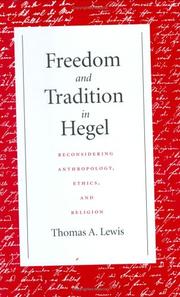| Listing 1 - 6 of 6 |
Sort by
|
Book
ISBN: 9780199595594 Year: 2011 Publisher: New York, N.Y. Oxford University Press
Abstract | Keywords | Export | Availability | Bookmark
 Loading...
Loading...Choose an application
- Reference Manager
- EndNote
- RefWorks (Direct export to RefWorks)
Civilization, Modern --- Philosophy and religion --- Philosophy, German --- Religion and politics --- Political science --- Politics, Practical --- Politics and religion --- Religion --- Religions --- Christianity and philosophy --- Religion and philosophy --- Philosophy --- Religious aspects --- Political aspects --- Hegel, Georg Wilhelm Friedrich. --- Hegel, Giorgio Guglielmo Frederico --- Hegel, Georg Wilhelm Friedrich --- Hegel, Georg W.F. --- Hēgeru, --- Hei-ko-erh, --- Gegelʹ, Georg, --- Hījil, --- Khegel, --- Hegel, G. W. F. --- Hegel, --- Hei Ge Er, --- Chenkel, --- Hīghil, --- הגל, --- הגל, גאורג וילהלם פרידריך, --- הגל, גיאורג וילהלם פרידריך, --- הגל, ג.ו.פ, --- היגל, גורג ווילהלם פרדריך, --- היגל, גיורג וילהלם פרידריך, --- 黑格尔, --- Hegel, Guillermo Federico, --- Hegel, Jorge Guillermo Federico, --- Heyel, Georg Wilhelm Friedrich, --- Higil, Gʼūrg Vīlhim Frīdrīsh, --- هگل, --- هگل، گئورگ ويلهم فريدريش,

ISBN: 9780268033682 Year: 2005 Publisher: Notre Dame, Ind. University of Notre Dame Press
Abstract | Keywords | Export | Availability | Bookmark
 Loading...
Loading...Choose an application
- Reference Manager
- EndNote
- RefWorks (Direct export to RefWorks)
Book
ISBN: 0191062154 Year: 2015 Publisher: OUP Oxford
Abstract | Keywords | Export | Availability | Bookmark
 Loading...
Loading...Choose an application
- Reference Manager
- EndNote
- RefWorks (Direct export to RefWorks)
Work in philosophy of religion is still strongly marked by an excessive focus on Christianity and, to a lesser extent, Judaism -- almost to the exclusion of other religious traditions. Moreover, in many cases it has been confined to a narrow set of intellectual problems, without embedding these in their larger social, historical, and practical contexts. Why Philosophy Matters for the Study of Religion--and Vice Versa addresses this situation through a series of interventions intended to work against the gap that exists between much scholarship in philosophy of religion and important recent developments that speak to religious studies as a whole. This volume takes up what, in recent years, has often been seen as a fundamental reason for excluding religious ethics and philosophy of religion from religious studies: their explicit normativity. Against this presupposition, Thomas A. Lewis argues that normativity is pervasive--not unique to ethics and philosophy of religion--and therefore not a reason to exclude them from religious studies. Lewis bridges more philosophical and historical subfields by arguing for the importance of history to the philosophy of religion. He considers the future of religious ethics, explaining that the field as a whole should learn from the methodological developments associated with recent work in comparative religious ethics and "comparative religious ethics" should no longer be conceived as a distinct subfield. The concluding chapter engages broader, post-9/11 arguments about the importance of studying religion arguing, that prominent contemporary notions of "religious literacy" actually hinder ourability to grasp religion's significance and impact in the world today.
Religion --- Philosophy And Religion --- Philosophy --- Philosophy and religion

ISBN: 0268033684 Year: 2005 Publisher: Notre Dame University of Notre Dame press
Abstract | Keywords | Export | Availability | Bookmark
 Loading...
Loading...Choose an application
- Reference Manager
- EndNote
- RefWorks (Direct export to RefWorks)
Ethics --- Liberty --- Philosophical anthropology --- Religion --- Tradition (Philosophy) --- Philosophy --- Hegel, Georg Wilhelm Friedrich,
Book
Year: 1982 Publisher: Amsterdam Time-Life
Abstract | Keywords | Export | Availability | Bookmark
 Loading...
Loading...Choose an application
- Reference Manager
- EndNote
- RefWorks (Direct export to RefWorks)
Book
ISBN: 9780198744740 0198744749 Year: 2015 Publisher: New York Oxford University Press
Abstract | Keywords | Export | Availability | Bookmark
 Loading...
Loading...Choose an application
- Reference Manager
- EndNote
- RefWorks (Direct export to RefWorks)
Work in philosophy of religion is still strongly marked by an excessive focus on Christianity and, to a lesser extent, Judaism - almost to the exclusion of other religious traditions. Moreover, in many cases it has been confined to a narrow set of intellectual problems, without embedding these in their larger social, historical, and practical contexts. 'Why philosophy matters for the study of religion-and vice versa' addresses this situation through a series of interventions intended to work against the gap that exists between much scholarship in philosophy of religion and important recent developments that speak to religious studies as a whole. This volume takes up what, in recent years, has often been seen as a fundamental reason for excluding religious ethics and philosophy of religion from religious studies: their explicit normativity. Against this presupposition, Thomas A. Lewis argues that normativity is pervasive-not unique to ethics and philosophy of religion-and therefore not a reason to exclude them from religious studies. Lewis bridges more philosophical and historical subfields by arguing for the importance of history to the philosophy of religion.0.
| Listing 1 - 6 of 6 |
Sort by
|

 Search
Search Feedback
Feedback About UniCat
About UniCat  Help
Help News
News